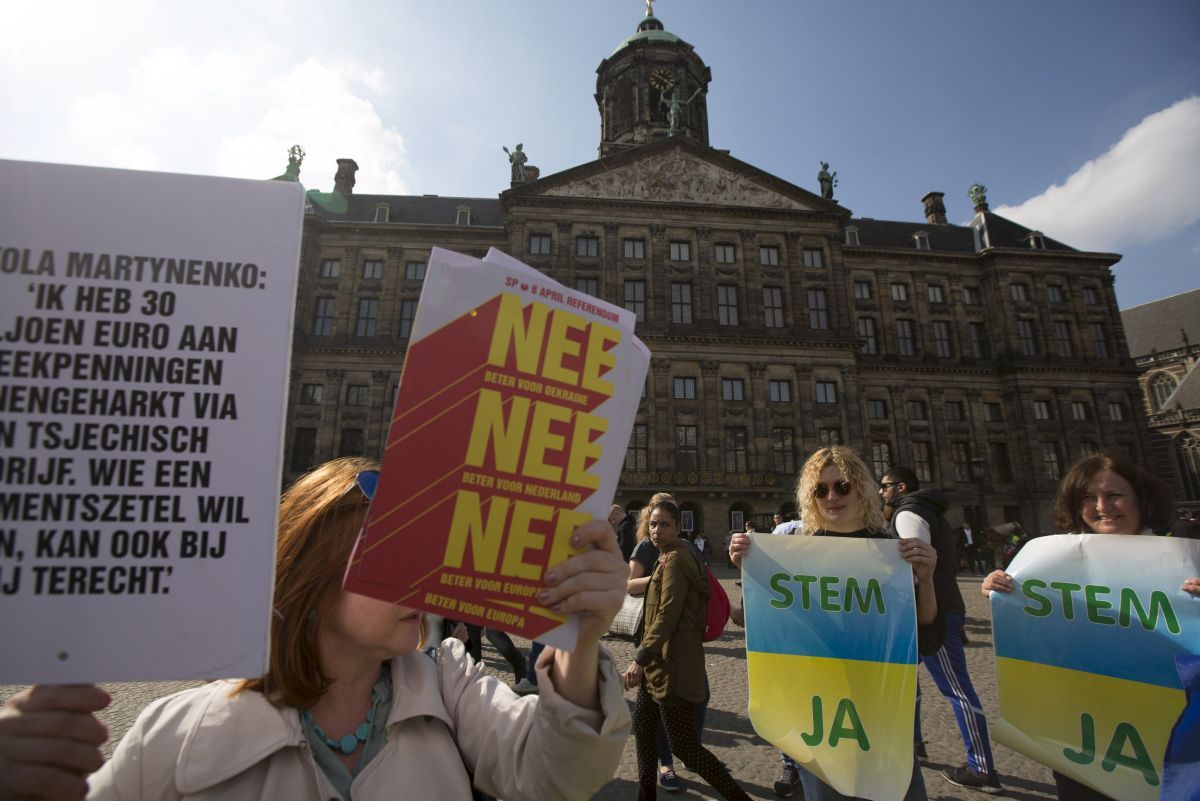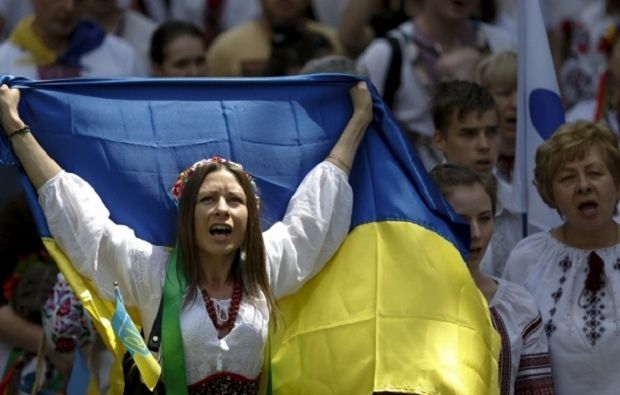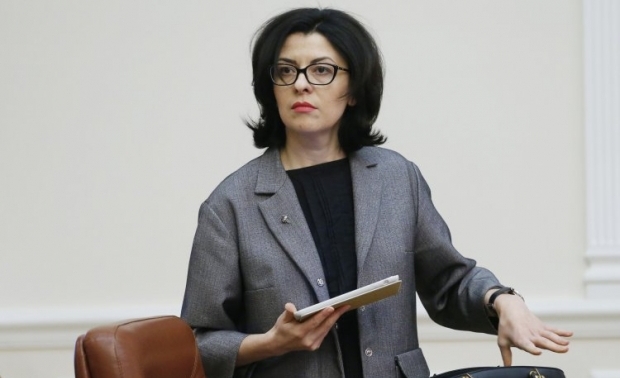
Will of people vs usurpation of power: danger of referendum without effective law
Ukraine has become a hostage of the Dutch referendum – these are today’s headlines in the Ukrainian newsfeed. But it has also become – much earlier – hostage of own not-so-farsighted law on national referendum.
At a time when the Ukrainians engage in hot discussions over the outcome of the Dutch referendum on Ukraine-EU Association Agreement, attention should be paid to another very important thing. The main lesson of the Dutch voting for Ukraine should be the understanding that such tools of democracy like the people’s will cannot be used irresponsibly and/or for manipulations. However, possibilities for such options have been planted into Law On National Referendum at the times of the Yanukovych rule.
Legal inconsistencies
The history of referenda dated back to the times of the beginning of Ukrainian independence – the first national referendum with a single question to the nation: "Do you support the Declaration of Independence of Ukraine?" was held on December 1, 1991. The outcome saw more than 90% Ukrainians supporting the move, with a 84.18% turnout. This plebiscite is by far the only one in Ukraine that had legal consequences. The decisions sealed in the rest of them were never implemented. And of course, there was no way there could be any implementation in the case of Crimean pseudo-referendum of 2014 on Crimea’s accession to Russia, when there was, in fact, the annexation of the Ukrainian peninsula by Russia; or the subsequent “vote at gunpoint” in the eastern Ukrainian Donbas.

One of the main reasons why such tool of democracy as people's plebiscite is so pathetic in Ukraine lays in the ineffective legislation and lack of understanding of what issues should be put to a national referendum, and what should be the prerogative of local voting. For example, under decentralization, it would be appropriate to enable communities to address issues of local government through local referendums. Unfortunately, this form of citizen participation cannot be realized in everyday life after the adoption in 2012 of Law On National Referendum (upon the will of the then President of Ukraine Viktor Yanukovych, as insurance – to be able to pass necessary decisions by referendum if they are not supported in Parliament), because this document does not provide for setting up and holding of local plebiscites.
It should be reminded that the for draft law on national referendum No.6278 of April 29, 2010, was held November 6, 2012, quite unexpectedly. The bill was adopted in the first reading and as a whole, literally, in 10 minutes. This is despite the fact that, before the second reading, almost a thousand amendments were filed, and it was earlier harshly criticized by the Venice Commission (in particular over the norm allowing the authorities submit to the referendum the issues of Constitutional amendments, as it is contrary to the very Constitution). Also during the vote, the deputies resorted to an embarrassing practice of pushing buttons for their colleagues missing at the session (less than 100 deputies attended in the meeting, while the law needed 226 votes to slide through Parliament).
However, this pace could be explained quite simply – the Party of Regions wished to use the law to put to a referendum a question of Ukraine’s integration vector. Moreover, one of the social-political organizations created by a person closely tied to Vladimir Putin, Viktor Medvedchuk, who in 2012 was "aiming" at a prime minister’s seat, has for more than six months imposed on the Ukrainians the ideas of “implementing the principle of direct democracy." That is, it promoted the need for a referendum on Ukraine's accession to the Russian-orchestrated Customs Union and the federal structure of the Ukrainian state...
Disputes
Of course, this was never realized. In two years, the country has gone through dramatic changes, but a "phantom pain" from the law on national referendums adopted in 2012 is still haunting Ukraine. The thing is that over the recent years, there have become more calls to address certain issues through a plebiscite. First of all, it is about the special status of Donbas in the context of amending the Basic Law.
According to recent opinion polls, more than half of Ukrainians (51.2%) speak out against it one way or another. However, according to experts of the Coalition titled "For Fair Referendum," given that the Parliament will fail to provide 300 votes to support Constitutional amendments, while Russia’s pressure to implement the Minsk agreement keeps building up, the approval of the provision regarding Donbas (and as an alternative to holding elections in areas beyond government control in Donetsk and Luhansk regions) a referendum may be used as well. "Recent media reports say that in the context of the Minsk agreements, a referendum may be held to legitimize certain decisions, to ease public tension in that part of the society which does not accept the Minsk Agreement. If this law is used to legitimize such decisions, it will lead to more turbulence and undermine the authority of the state in the international arena as well as trust in government," says MP from the Bloc of Petro Poroshenko Svitlana Zalishchuk.

Experts insist that the application of the current version of the law on national referendum can lead to distortion of any results of people's will and be used to usurp power, so it must be abolished as soon as possible.
Main disadvantages of the old law
The first step toward this was made December 1, 2014, when 57 people's deputies lodged a constitutional submission with the Constitutional Court of Ukraine with a request to verify compliance of Law On National Referendum with the Ukrainian Constitution. The court started considering the submission in February 2015, at the initiative of Constitutional Court judge Petro Stetsiuk, but for almost half a year, the case was halted. Oral hearings only began on March 24, 2016.
According to Zalishchuk, the court has delayed the proceedings for so long because the judges had been given a tacit instruction not to rush with the adoption of conclusion. "We were unsure whether we should go to the Constitutional Court... I have no confidence in this composition of the court because I don’t consider it independent and impartial," said Deputy Rada Speaker Oksana Syroyid, adding that whatever the court ruling, this is more about appealing to the citizens.

"[We wanted] the people to understand what danger lies behind this law," she said.
The danger is real, indeed. According to an expert on constitutional law, head of the Center for Political and Legal Reforms, Ihor Koliushko, the law is not in line with the Constitution and can be used to usurp power, in particular by submitting to the referendum the issue of amending the Constitution. "Holding a national referendum in accordance with the current law could lead to the complete destruction of Ukraine’s legal system of Ukraine,” he said.
According to the expert, this is the mechanism – strengthening authority through a referendum – was earlier used by the presidents of Belarus and Kazakhstan.
In turn, an expert on election law Yevheniy Radchenko recalls that the current law is written out so that the preparation and holding of the referendum is under full control of the authorities. "The law does not provide for the participation of political parties in forming election commissions and even the possibility of them having official observers... Composition of district commissions is approved upon proposals of the heads of regional councils, and composition of local commissions – upon submission by rural heads or executive committees. That is, there will be no opponents of the referendum in these commissions," he said.
In addition, he said, opponents of the referendum are effectively denied access to the media, since the law essentially prohibits criticizing referendum in the media (any use in the media of the word "referendum" will be considered campaigning, and such material may be challenged in court). Experts believe that such provisions in the law – the so-called "cooling effect" – are an attempt to put the media in an environment, in which it would be preferable not to cover the event. Only ECHR could stand up for the media, but this court’s hearings last between two and five years...
Another danger, according to the expert, is the lack of a minimum turnout threshold. "The law contains no rules on the minimum number of voters for it to be recognized valid," he says.
That is, a referendum is deemed valid even if that was attended by a 100 people.
Is there no time for a new law?
All these problems are also confirmed by the Europeans. A senior adviser to the International Foundation for Electoral Systems (IFES), director of IFES in Ukraine, Peter Erben, said the Venice Commission in its conclusion of June 14-15, 2013, stressed that the law on a national referendum contradicts not only the Constitution of Ukraine, but also the European standards of setting up and holding a referendum. Therefore, under the current conditions, an important task for Ukraine is to create a new legal framework for plebiscites, according to the expert.
According to the presidential representative to the Constitutional Court, Rostyslav Mykheyenko, the Head of State supports the idea of adopting a new law on referendum. According to the guarantor of the Constitution, Parliament has to adopt a new document, stating therein that the current law, which is being challenged in the Constitutional Court, should be abolished while adopting the new one.
Incidentally, the draft law meeting international standards and not allowing for manipulation, minimizing the possibility of usurpation of power through referenda, was submitted to Parliament in June 2015. But the deputies, who still can’t complete a coalition puzzle, have not yet considered this bill.
Liuba Bolbukh

